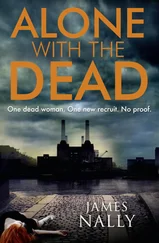By this time, the men were gathered at the edge of the trees, to look. No one moved. The Brazilian general, Camarrá, had a contingent ready to set around her, because the Paraguayan women had started to wail the death of Lopez. It was a foiled, pathetic cry, as though they might as soon tear the body apart as bury it. And, if they could not kill him, because he was already dead, then they might settle for killing her.
Eliza listened. She bent from the waist and took something out of the corpse's boot. It was a knife, but instead of lifting it and lowering it into her own heart, she crouched and slammed it into the ground, just there, where his eyes were fixed on the blades of grass. She talked to him in English as she dug, so that no one would approach. You could hear the metal eating the earth and the hard-sounding phrases as she spoke. Sometimes, too, little whispers in French, which was the language they used when they were alone. She paused now and then, and sat back, because the knife was small and her hands were small, and the hole she had in her mind's eye would not be emptied of earth until it was night.
She cried for a while in the middle of the afternoon and scrabbled faster, scooping the dry red earth with her bare hands up and away to form a shallow bowl, which might, when you looked at it, be enough to keep the wild animals off. Then she stood, and organised herself. She brushed her skirt and pulled each sleeve down to the wrist. She tucked a stray lock behind her ear, then felt around the back of her head and freed the mass of her hair. The stuff fell down behind her, and she shook it out and swung it to one side, before gathering it to be wound into some mysterious knot. It was so deftly done; her hands moving, once, twice. Then one hand held the pile, while the other reached for the pin that had appeared somehow between her teeth, as though she had coughed it up.
She glanced at the crowd. She walked around the body of Francisco Lopez so that it lay between her and the grave she had made for it. Then she bent down again and started to push, then roll him in.
And so it was nearly done.
Stewart looked around the camp they had set the night before, now smashed and overrun. They were in a wide valley, a high bowl in the mountains – the Cerro Corá. A man with a pack mule had told them the name of the place, and then he walked on. They had let him go – as though this was not a war, with the imperatives of war, but simply a road they were on, where a man might travel the opposite way.
Lopez was losing his touch – he who understood more than anyone what a war demands: that you must shoot your own brother, you must shoot your brothers-in-law. You must make your mother swear that you are the only legitimate child of your father Carlos Antonio, the previous Dictator Lopez. You must whip one story out of a man's back and then whip a different story out of his front. You must always change the details or, if the details remain, you must change the conclusions. You must make the facts of the matter shift and wriggle, so that when the time comes, there is nothing real for the enemy to kill.
But the man went by, alive, and his valuable mule was let go with him, and he walked until he found the Brazilian army, and he led it back to where they were, like pulling a toy on a string. And so it was that the man who betrayed Lopez, in the end, was the one to whom he had been most indifferently kind.
They debouched into the valley from two sides, hidden by the folds in the mountains; and, without stopping or regrouping, without a strategy of any kind, they ran towards the Paraguayan camp. Perhaps it was apparent that they did not need a strategy, and this last discourtesy made Stewart look about him at the fleeing, scrabbling crowd, who picked up what they could by way of food or children and ran towards the stream of Aquidabánmi. Perhaps 'crowd' was too big a word for them now. They were a travelling show, an eviction, a village wandering from some clearance. They were people who had no lives left to lose.
Despite which, the Brazilians were upon them like a band of grinning robbers, whistling to each other and whirling weapons over their heads; blades and lances – it was too close for shooting, and too scattered for much close work. A man, galloping low and hard, scooped off a man's head with his sabre, and was cheered as though for some trick, as the surprised neck shot its exclamation of blood in the air.
A stumbling man turned to shoot Stewart, and he had the face of a middle-aged boy. There was some disease that did that to you, Stewart thought, as the pubescent old man lifted his rifle to his shoulder – now, what was it called? The shouted gutturals of his Portuguese sounded, at this close range, like something twisted, perhaps evil; like Spanish gone askew. Stewart thought how foreign it sounded. Then he remembered that he was British, so all languages were foreign, really. Finally he realised that if he was British then there was no reason to kill him, because this wasn't, strictly speaking, his war.
With sudden conviction he lifted up, for the wizened child's attention, an empty bottle of turpentine in one hand and a Smellie obstetrical forceps in the other; both snatched from his open bag. The child looked at them and stumbled onwards, his legs still going crosswise in their fatal dressage. The rifle lingered on Stewart's face, the angle became more acute, and then it slipped away – at which precise moment, the boy pulled the trigger and, still shouting, swung the muzzle around, and ran on.
Stewart looked at the forceps. It was shaped like giant scissors. Each leg was a loop of metal ribbon which was shaped to fit the soft contours of a baby's head. Perhaps the loops were intended to fit around the baby's ears. Stewart was not entirely sure. He had brought the forceps with him from Britain in order to deliver Pancho, the first son of Eliza Lynch. It was the last thing he had about him of 'William Stewart, physician-accoucheur', and he was amazed that it had survived all this time: it had not been whittled down for cutting or stabbing, nor had it been chopped up for shot. Stewart used it, mostly, for cooking – it was handy when you wanted to extract something, or turn it over in the campfire. But there was something, evidently, in this set of blackened tongs that meant that he was either a doctor, or too mad to kill, because the Brazilians rode past him now, as he gazed at the forceps that had delivered him his own life. And, by the time it had happened, by the time it was known – whatever knowledge that rushes through a battlefield so fast that fighting men look at each other, and falter, and stop. By the time it was over – which was very soon. Stewart found himself standing in a meadow, alive.
The work that had been done was the shooting of Francisco Solano Lopez. There were few enough rounds fired, and Stewart thought he might have heard the particular shot echoing around the bowl of the hills, long after it had hit the man's escaping back.
One soldier claimed he had seen it, as they stood, and then sat, in the shadow of the trees to watch Eliza Lynch. He said it happened in the middle of the stream. The horse had fought to get out from under him as II Mariscal jerked bolt upright – almost surprised – and then pitched forward on to the animal's neck. The man said the horse was having none of it, and upped Lopez into the stream, where he thrashed a little before the bubbles came. So it was the horse that killed him as much as any Brazilian, he said. Another few feet and he might have made it, he might be gone clear, or he might be captured and sitting here with them now. The thought amazed them all so much they fell silent, and looked to where the man lay to check that he was still dead.
A few crossed themselves.
Another man said that the horse knew it was time. The thing they hate, the thing they fear most, he said, is to crush a man. And worse than that to have a dead man on their backs. He said, too, that Lopez loved that horse. All horses, he said, after a while. He said that Lopez loved every horse he ever rode. And that the horses repaid that love. Or usually they did.
Читать дальше












